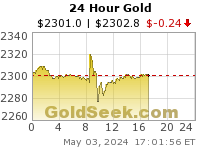A FREE myth-busting report from Club EWI reveals the real force behind long-term trend in financial markets
Conventional economic wisdom is founded on one core concept: namely, that events that exist outside the market (part of "market fundamentals") trigger trend changes in the financial markets.
Because of this belief, you have the mainstream experts of finance watching everything from weather patterns to crop conditions, political exploits to the subtlest changes in punctuation in the Fed's minutes -- all in the hopes of anticipating the next big move in commodities, stocks, gold, the dollar, etc. In a nutshell, "positive" news and events cause a rise in prices, while "negative" news pushes prices down.
In reality, however, things are not as clear-cut. Markets regularly "ignore" the news, shrug it off -- and move in the opposite direction of their "fundamental" cues. OR, worse waver in two different directions after the same event.
Take, for instance, the recent slew of news items following Federal Reserve chairman Ben Bernanke's March 1 testimony before the Senate Banking Committee:
- "US Stocks Advance Ahead of Bernanke's Testimony" (International Business Times)
- VERSUS -- "US Stocks Turn Lower As Bernanke Testifies To Congress" (NASDAQ)
- VERSUS -- "US Stocks Rise With Bernanke In Focus" (MarketWatch)
- VERSUS -- "Stocks Decline As Bernanke Comments Fall Flat." (Wall Street Journal)
The fallacy of a news-driven market is the first misconception exposed in Elliott Wave International's Club EWI free resource "The Independent Investor" eBook. Here's a short preview of this eye-opening report.
Chapter 1 opens with the question "What Really Moves the Market?" You then get the answer via riveting excerpts and charts from EWI president Bob Prechter's monthly Elliott Wave Theorist publications, such as this one below:
"Suppose the devil were to offer you historic news days in advance. He doesn't even ask you for your soul in exchange. He explains, 'What's more, you can hold a position for as little as a single trading day after the event or as long as you like.' It sounds foolproof, so you accept. His first offer: 'The President will be assassinated tomorrow.' You can't believe it. You and only you know what's going to happen. The devil transports you back to November 22, 1963. You short the market. Do you make money?
The first arrow in Figure 6 shows the timing of the assassination. The market initially fell, but by the close of the next trading day, it was above where it was at the moment of the event. You can't cover your short sales until the following day's opening because the devil said you could hold as briefly as one trading day after the event, but no less. You lose money."
Independent Investor eBook further exposes 10 other commonly held economic beliefs for what they truly are: Wall Street myths disguised as reality. Here's what else you'll learn:
- The Problem With “Efficient Market Hypothesis”
- How To Invest During a Long-Term Bear Market
- What’s The Best Investment During Recessions: Gold, Stocks or T-Notes?
- Why "Buy and Hold" Doesn’t Work Now
- How To Be One of the Few the Government Hasn’t Fooled
- How Gold, Silver and T-Bonds Will Behave in a Bear Market
- MUCH MORE
This article was syndicated by Elliott Wave International and was originally published under the headline Breaking News Bulletin: News Is NOT the Main Driver of Stock Market Trends. EWI is the world's largest market forecasting firm. Its staff of full-time analysts led by Chartered Market Technician Robert Prechter provides 24-hour-a-day market analysis to institutional and private investors around the world.



No comments:
Post a Comment